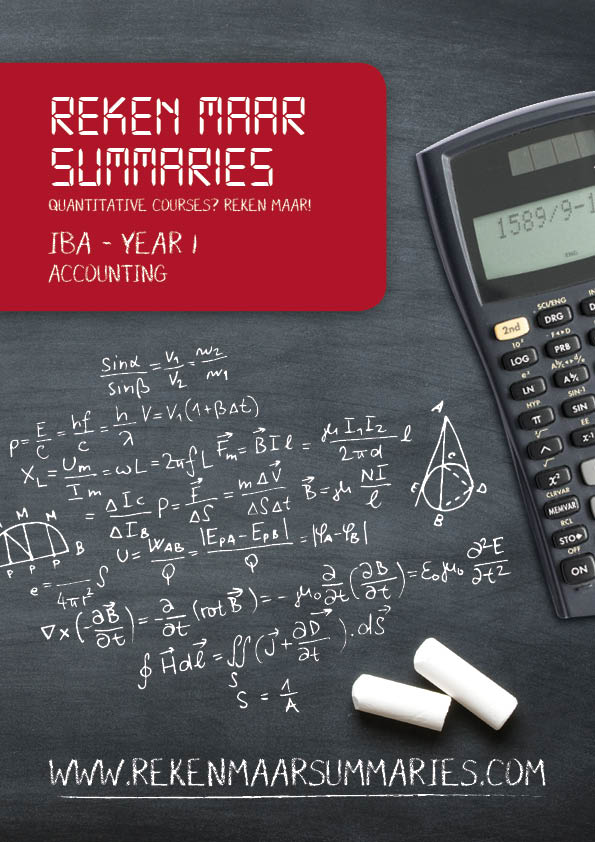Geen producten in de winkelwagen.
< Alle onderwerpen
Summary Accounting Erasmus
Geplaats op
Laats bijgewerkt op
Do you need a summary accounting International Business Administration Erasmus University Rotterdam EUR? With this summary your exam will be a piece of cake!
“Hours and hours of studying in the library for your Corporate Finance exam. So much difficult subjects at once. I am completely overwhelmed by it.”
Does this line of thought seem familiar? If so, you’re in luck. Because Reken Maar Summaries has the solution for you.
The course accounting is considered one of the hardest in the whole bachelor International Business Administration at Erasmus University EUR, maybe you even experienced this yourself. Subjects like financial statement analyze and the balance sheet are broadly considered difficult among students. Do you want to pass your exam accounting at Erasmus University EUR? Get started right away with the summary accounting at Erasmus University EUR. Below you can read what to expect from your exam and how to solve the problems you will face during this course: we give you some inside info.
Do you want to pass accounting at Erasmus University EUR with an amazing grade? Then click here to order your summary accounting!
Do you want to learn more about accounting or do you want to get a short introduction in the core subjects of this course? Down below you can read what to expect of this difficult course.
Summary accounting Erasmus University Rotterdam: Core Concepts
We can define accounting as a process of recording, summarizing and analysing financial transactions. The accounting information that a corporation produces, can be short into two categories. There is a difference in the usage of the information. Financial accounting is primarily used by decision makers outside of the company (external. Managerial accounting is on the other hand used by the decision makers inside the company (internal. In this course we focus on the financial accounting part.
· Core Concept 1: Financial statements
· Core Concept 2: Cashflow statement
· Core Concept 3: Financial statement analysis
· Core Concept 4: Assets
· Core Concept 5: Liabilities and equity
Down below we will discuss these concepts with you.
Core concept 1: Financial statements
The course accounting is mostly about the bookkeeping of a company. The financials of the company are presented in the financial statements. Financial statements have a couple of functions. They inform about the risk and yield of shares of a company. They also show if the management is doing good. And the statements disclose the plans and project the management is working on.
The following statements will be touched upon in the accounting summary Erasmus Universiteit Rotterdam:
· balance sheet
· income statement
· statement of changes in equity
· statement of cash flows
It is important to recognize these financial statements and link them together when you see them, this will definitely be useful for your exam. The four financial statements are used to report periodic about the activities of the company.
Core Concept 2: Cashflow statement
As you have seen the cashflow statement is one of the financial statements, but where is the cashflow statement itself used for? En how do we compute this statement? The cashflow statement has two important goals for the cashflow statement:
· It gives inside to the liquidity and solvability of the company.
· It explains the change in cash and cash equivalents of a company.
Additionally, you need to be able to compute the cashflow statement. To do this there are to different methods the ‘direct’ method and the ‘indirect’ method. In the summary accounting Erasmus Universiteit Rotterdam both methods would be discussed with easy-to-follow examples and example questions to test your new knowledge about this subject.
Core Concept 3: Financial statement analysis
Banks or other investors look at different things, when they analyse a company through the financial statement. In the income statement, they mainly look at the profit expressed as a percentage of turnover. This is the net margin. In the balance sheet, they look at what has been invested to make the same profit. The fewer assets are required for a given amount of profit, the better. It is also important for banks to have a lot of cash. The more cash the better. This means that the money is not stuck in machines or something like that. It is important for shareholder to have as few liabilities as possible. Shareholders need to invest less for the same return.
In the accounting summary Erasmus University Rotterdam, we will discuss all the analysis and ratios in this core concept. Formulas for gross profit margin, operating profit margin and the net profit margin will be discussed in this summary. In addition to the explanation on the theoretical side of thing, the summary also contains plenty of examples and exercises to practice with the matter.
Core Concept 4: Assets
Together with the next core concept this one is part of the balance sheet, one of the financial statements. On the balance sheet all possessions, named the assets, are noted. In the accounting summary Erasmus University Rotterdam, we will look at different ways to value the assets. Assets can be valued on basis of cost price, or they can be valued on basis of gross value.
Because assets last several years, you can’t subtract a; the costs in the year they are bought them. Instead, you must depreciate them. In the accounting summary Erasmus University Rotterdam, we will discuss the following depreciation methods:
· Straight line
· Double declining balance
· Units of production
Let’s look at an example.
The Van der Goot building consists of different components with the following life times and values.
· Skeleton: 60 years | 200 million
· Finishes: 36 years | 50 million
· Equipment: 18 years| 20 million
· No residual value
What is the book value of this building after 5 years of depreciation? These questions can be considered difficult because there a different component to take into account and that can cause confusion. The building cannot be depreciated at once and with one method so you need separately depreciate every component with the right method. If you want to know how to solve these types of questions or if you want to learn more about accounting, then order the accounting summary over here!
Core Concept 5: Liabilities and equity
Now we look at the other side of the balance sheet, the liabilities. This core concept will look at how all those assets are funded. As the title shows this can be down via liabilities or equity. When funding a company, it is important to take into account the time value of money. The fact that you borrow money that could be used to make more money makes it so you have to pay interest over this amount. In the accounting summary Erasmus University Rotterdam, we will take a deep dive into the time value of money will looking at liabilities to clarify this subject we use recognizable examples and easy to follow practice exercises.
To fund a firm, you cannot only build upon loans, but you would also need to it partly with own money, this is called equity. Equity consists of the following components: market premium, other reserves, retained earnings, additional paid- in capital and par value. In the summary accounting Erasmus University Rotterdam, we will discuss both subjects in detail!
Summary accounting Erasmus Rotterdam: Structure of the Exam
The exam will be a mix of pure theory and calculations on different subjects. For this course practice makes perfect. The Corporate Finance Erasmus University EUR summary consists of lots of example question, practice exercises, old exam questions and practice exams. While making these exercises you will get a good feel for the real exam and therefore you will not be surprised by any questions.
It’s important to be precise with the calculations, to do this it is important to know all the formulas. In the summary accounting Erasmus University Rotterdam, we included an entire overview of all the summaries. In this way you can easily learn them to make sure you won’t get surprised at your exam.
Summary accounting Erasmus Rotterdam, everything you need to pass
As you have seen by now this course consists of a hard mix between terminologies and subjects with a lot of calculations, so you both need your academic thinking as well as your math skills to pass this course. With the accounting Erasmus University EUR summary from Reken Maar you have everything you need to turn this course into a success. Every subject gets touched upon and all subjects are easily explained with clear examples and practice exercises to prepare you for your exam and the question to come.
The summary of Reken Maar will be your best buddy during this course. Order your summary over here. On behalf of the whole Reken Maar team we wish you all the best with the preparations and best of luck with your exam!
Interested in accounting? What jobs can you get?
As you know by now accounting is all about the bookkeeping of a company, if you’re interested in accounting then you’re mostly likely in the financial world. You could be a freelance accountant and divide your work between companies or you could choose to work on the financial department of any firm you may interest. Later in the bachelor you will get a lot more courses focused on the financial management of companies. In these courses you could look If you’re really interested in the financial world and which job or working field suits you best.
On behalf of the whole Reken Maar team we wish you all the best with the preparations and best of luck with your exam!

